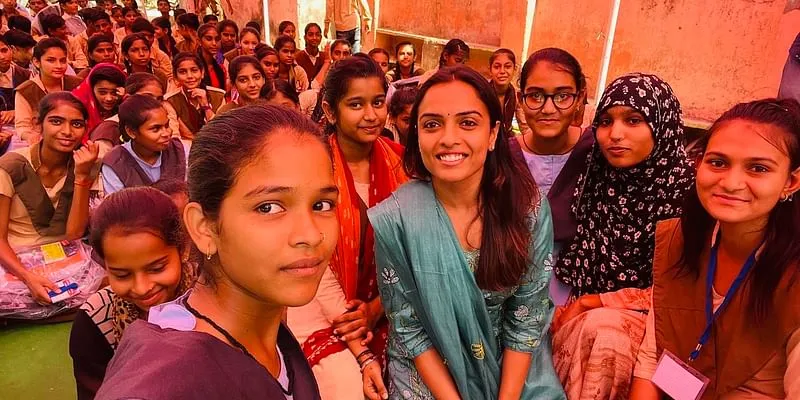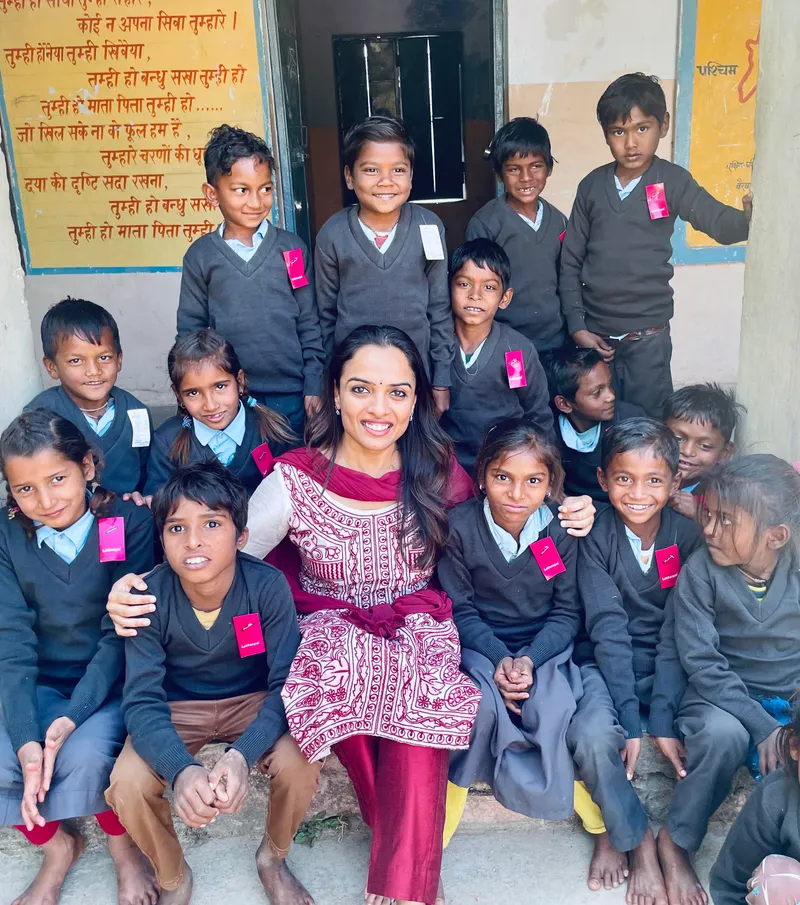This doctor-turned IRS officer is working towards social change
Our Women in Governance series features Dr Megha Bhargava, an IRS officer, who has held key portfolios in domestic and international taxation and investigation of economic crimes. She’s also the Chief Advisor of Samarpann, an NGO working towards education, and healthcare in six states.
Growing up in Kota, Rajasthan, and being exposed to the academic rigour the city is known for, it was natural for Dr Megha Bhargava to aspire for a career in medicine. Her mother, a school principal, was also a driving factor behind her daughters’ focus on academics and competitive exams since childhood.
After sailing through the AIPMT exams, Bhargava chose to join the Government Dental College and Hospital, Mumbai, to pursue dentistry. On passing, she worked with the Ministry of Defence in its hospital for two years.

Dr Megha Bhargava (in green) working with students as part of Samarpann's initiatives
“During this tenure, while I was fortunate to work with a disciplined organisation, I also realised I wanted to do something more in terms of realising my true potential by working in a human-centric or people-centred profession. The civil services seemed to be the right choice,” Bhargava tells HerStory.
She worked at the hospital from 8 am to 4 pm and dedicated her evening hours to preparing for the exams. She scoured Orkut, Facebook groups, and blogs, and sailed through without any special coaching on her very first attempt. Not content with Defence Estate Services, she took the exams again the following year, and joined the Indian Revenue Services (IRS).
“The Academy trained me for the work ahead where we were taught accounting, tax laws and everything else relevant to the profession. But the actual training is on the job when you actually get to review cases, look into balance sheets and conduct investigations,” she says.
Implementing key schemes
She says she’s been lucky to be posted in Mumbai, a familiar city and also India’s financial capital. From 2012 onwards, Bhargava has been part of the tax administration, and also into investigation, which she believes has been one of the most challenging assignments so far.
While she’s unable to disclose specific cases owing to confidentiality, she believes learning how to augment the tax base, and widening it during investigation and during assessments has held her in good stead.
A year in international taxation also exposed her to the intertwining of economies and the implementation of taxation in conjunction with international tax treaties and following the OECD Model Tax Convention.
In her current role as the Joint Commissioner, Income Tax (Intelligence & Criminal Investigation), Ministry of Finance, Bhargava is involved in implementing the government’s E-Verification Scheme launched last year.
She elaborates, “The aim is to establish a non-intrusive but transparent tax administration that also minimises litigation. The income tax department in a citizen-centric manner is encouraging voluntary tax compliance and has become one of the most tech-savvy government departments.”
The idea is to make citizens realise the importance of taxation and be responsible for it.
The second facet of her job is to allow for a seamless exchange of information between countries to counter tax evasion or money laundering by complying with international provisions in this regard.
In 2021-22, Bhargava bagged a Cambridge Commonwealth Shared scholarship to pursue an MPhil in Public Policy at the University of Cambridge. After 10 years in service, she was looking at learning more about policymaking and the course seemed to be the right choice.
“The diversity of people in my cohort led me to understand different perspectives and now I am more geared towards customising solutions learned and apply them in India,” she says. Also, an Acumen Fellow of 2019-2020, her contribution, she says, was to bridge the gap that exists between civil society and the government by understanding their defined roles and how they could work together for social good.
Driving social change

Her aim of working towards social change can also be seen in her efforts with Samarpann, an NGO started by her sister, Ruma Bhargava.
Founded in 2016, Samarpann, where she is the Chief Advisor, works at the grassroots level in Maharashtra, Rajasthan, Madhya Pradesh, Arunachal Pradesh, Uttarakhand, and Delhi. It has impacted over 26,000 children in 90+ schools through various initiatives.
Bhargava elaborates, “Education, menstrual hygiene, WASH (Water, Sanitation and Hygiene), solar electrification of schools, menstrual hygiene and generating livelihoods are our main projects.”
Around 3,200 Adhyayan kits (stationery) have been distributed to children in Rajasthan, Uttarakhand, and Maharashtra. To light up non-electrified villages, the NGO is distributing solar lanterns that work seamlessly for 18 hours.
Adolescent girls are provided with biodegradable sanitary pads and sessions on menstrual hygiene are organised in schools. Also, mobile medical diagnostic and treatment camps are organised in government schools and colleges.
She believes that NGOs and government agencies work hand-in-hand for smooth implementation of projects.
“Our NGO runs largely with volunteer help, support from school teachers, and management committees of schools and principals. The civil society, government sector and private sector have to come together in identifying the right beneficiaries and implementing the programmes on-ground. We are happy to work with all relevant stakeholders to ensure far-reaching outcomes,” she says.
This was evident during the Covid-19 pandemic, when Samarpann teamed up with the Brihanmumbai Municipal Corporation (BMC) to provide 2.5 million meals, ration for families, sanitary products for women and milk packets for kids. This was also replicated in Bengaluru, Hyderabad, Kota, and other cities. The local police, district administration, volunteers, and NGOs worked hand-in-hand during this period.
When asked whether it’s difficult to juggle her career with her social work, Bhargava says passion overrides all challenges.
“If you really have the passion to do something, you will always find time to do it. I work with a really dedicated team, including my sister, and together we make field visits, and the smile on children’s face is all worth it,” she says.
“You derive the true meaning and purpose of your life when you are able to help people,” she adds.
Career-wise, she’s also looking forward to working with the government to develop and implement sound policies in finance, health, or education where her interests lie.
Edited by Megha Reddy







